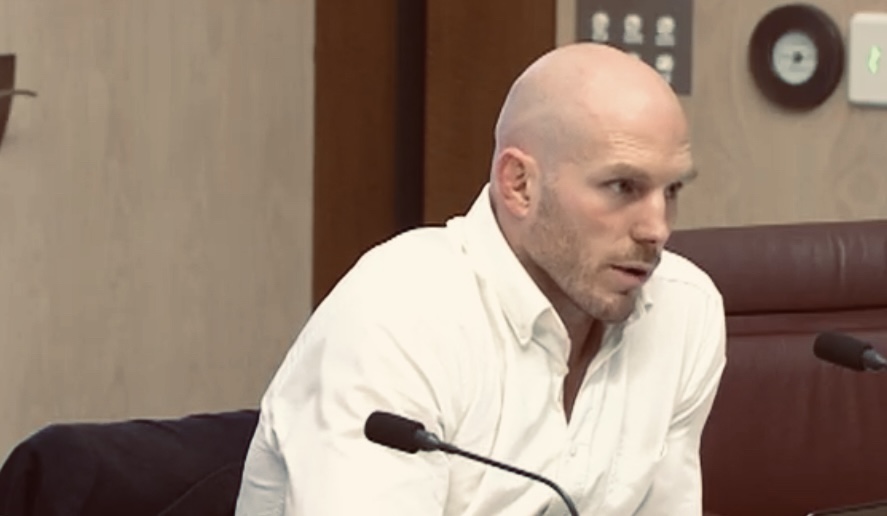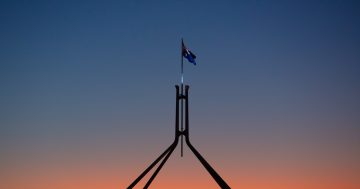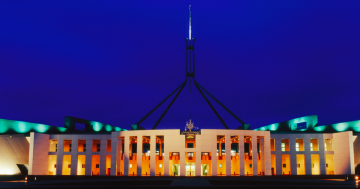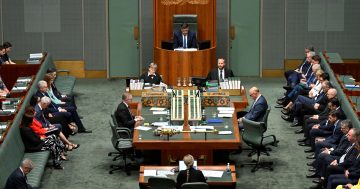
Senator David Pocock asking questions about the access lobbyists have to Parliament House. Photo: Screenshot.
The access political lobbyists have to the corridors and backrooms of Federal Parliament and to the offices of ministers, MPs and senators is coming under close scrutiny.
The Senate Finance and Public Administration References Committee, comprising members from both major parties and the crossbench (including ACT independent senator David Pocock), sat on Monday (8 April) and heard from a range of stakeholders.
The hearing’s purpose was to discuss whether lobbyists should be more open about who they are, who they represent, who they are lobbying, and what outcome they are lobbying for.
It is basically all about transparency.
Just how open about things should lobbyists be?
Security passes issued to lobbyists give them access to vast private areas in Parliament House, but currently, they don’t have to log where they go or make public who they are working for.
Neither do they have to publicly declare who sponsored them to get the pass.
MPs and senators can sponsor these security passes, but it is less widely known that parliamentary department heads can also do so.
No one’s name other than the pass holder appears on the pass, so it’s not widely publicly known who has sponsored which lobbyists.
That never used to be the case.
When they were actually known as lobbyists’ passes about a decade ago, the person seeking the pass had to get two MPs (members of either House of Parliament) to fill out forms and sponsor their passes.
The names of both MPs would then appear on the pass of the successful lobbyist applicant.
Every time a lobbyist swiped their pass through a security screen when entering Parliament House, their name and the name of the politician sponsors would appear on security monitors.
Passholders are required to display their passes clearly while inside parliament, so anyone can see who sponsored them.
Indeed, it was a bit of a game for some to expose another’s political allegiances by pointing out who had sponsored their passes.
That changed under the speakership of Bronwyn Bishop.
The changes she introduced took away the classification of a lobbyist pass.
They became sponsored passes, requiring only one MP sponsor, but with the addition of a police check being required.
The MPs (or department boss) must either tick a box on a form saying they’ve known the pass applicant for over 12 months, or they have to fill out a more detailed written explanation if they haven’t known them for over a year.
Everyone ticks the ‘known more than 12 months’ box.
That means anyone who hardly knows an MP but can pass a police check will quite easily be issued with a pass.
It must be stated, though, that sponsored passes carry fewer privileges than most other parliamentary security passes.
Sponsored pass holders can’t sign any guests into Parliament House or park their cars in the Senate or Reps staff car parks (they can, however, access the smaller, outdoor razorblade car parks on Melbourne Avenue).
Sponsored passes are issued for three years, loosely coinciding with the life of a parliamentary term.
But if an MP who has sponsored a pass either retires, loses a by-election or dies, anyone holding a security pass with their help is subsequently issued a notice giving them six weeks’ grace before their pass becomes invalid.
In these regards, the sponsored pass is a diluted pass.
It is also worth noting that not all sponsored passes are held by lobbyists.
Parents of children who use Parliament’s child care facilities can get sponsored passes.
Some sponsored passes are also issued to party loyalists (on all sides) who are politically involved yet have no other avenue for gaining a parliamentary pass.
These are issued very sparingly and go to factionally important figures and party grandees.
Unlike some state parliaments that regulate lobbyists’ access differently, the Federal Parliament is unique because it is quite the one-stop shop.
The Commonwealth has members, ministers and the whole legislature located in the same place. There is no adjacent ministers’ building – their offices are inside Parliament House.
Ministerial and MP meetings are often ad hoc and largely structured around sitting weeks when people travel to Canberra.
Certainly, the nature of many discussions around policy can’t be held at Aussies, the Queen’s Terrace Cafe or the staff dining room. Plenty of discussions are held in these places, but many necessitate much more privacy.
So yes, lobbyists have significant access to Parliament House, but mainly simply for matters of logistics.
The list of lobbyists with parliamentary passes (about 1800 of them) is not in any way linked to the lobbyists register and code of conduct administered by the Attorney-General’s Department (it used to be administered by the Department of Prime Minister and Cabinet).
The parliamentary passes for lobbyists are ultimately administered by the parliament’s presiding officers.
This committee scrutiny is important and the question of transparency should be thoroughly explored.
But while senators continue with their deliberations, it should be remembered that much of the nation’s finest policy developments have come about from honourable lobbying (there is a difference) – and lobbyists have to be able to meet with policymakers somewhere.
Original Article published by Chris Johnson on Riotact.










